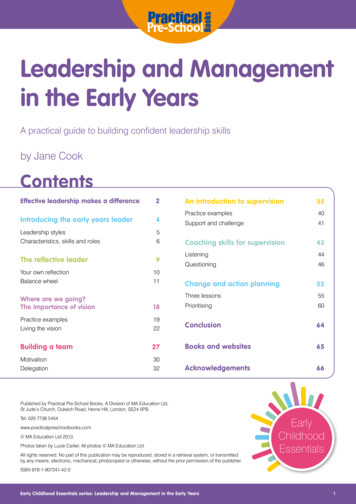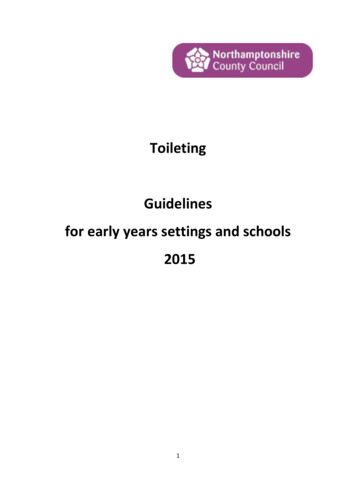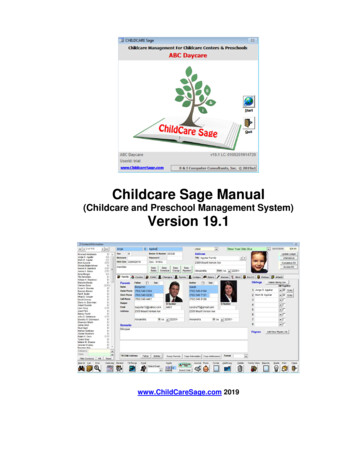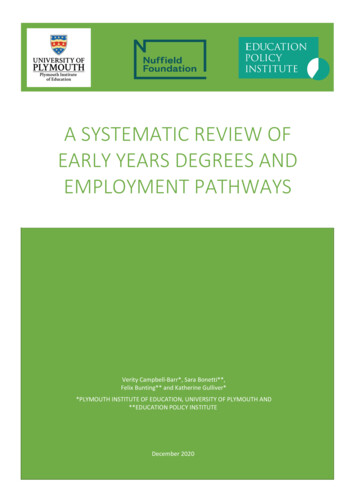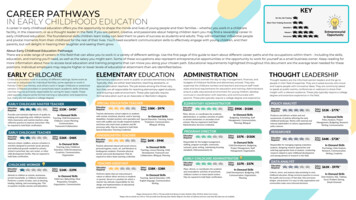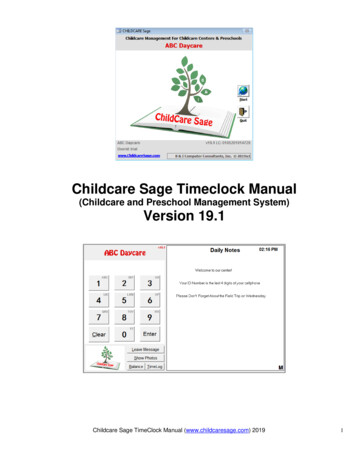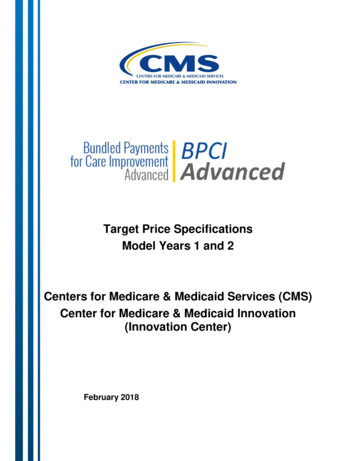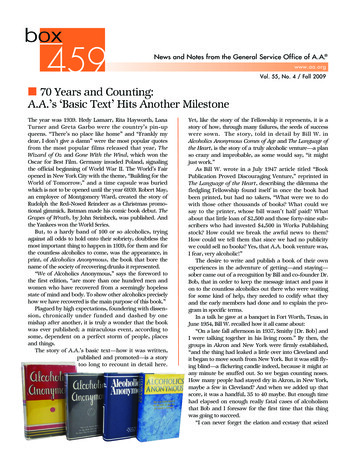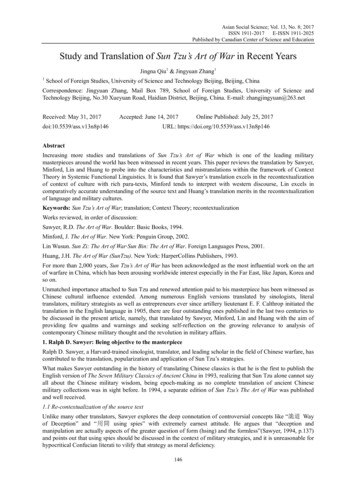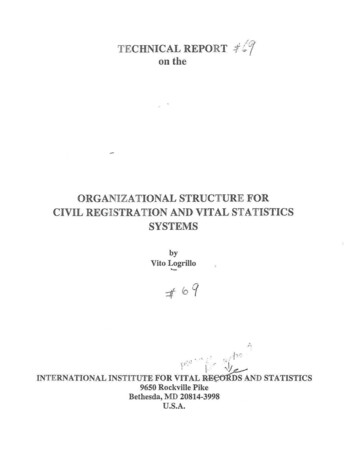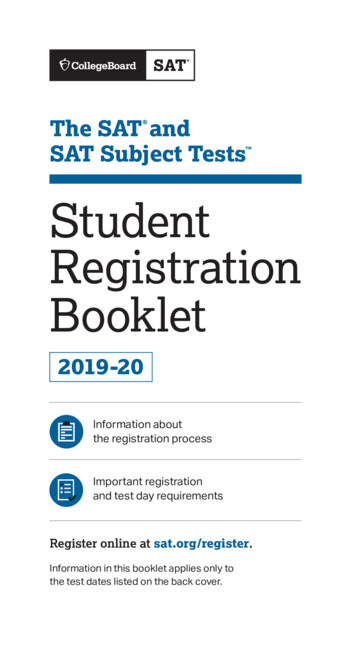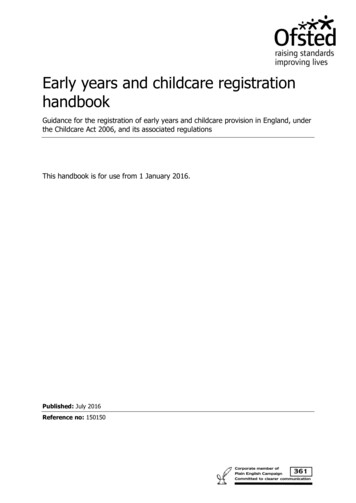
Transcription
Early years and childcare registrationhandbookGuidance for the registration of early years and childcare provision in England, underthe Childcare Act 2006, and its associated regulationsThis handbook is for use from 1 January 2016.Published: July 2016Reference no: 150150
The Office for Standards in Education, Children's Services and Skills (Ofsted) regulates and inspects toachieve excellence in the care of children and young people, and in education and skills for learners ofall ages. It regulates and inspects childcare and children's social care, and inspects the Children andFamily Court Advisory and Support Service (Cafcass), schools, colleges, initial teacher training, furthereducation and skills, adult and community learning, and education and training in prisons and othersecure establishments. It assesses council children’s services, and inspects services for looked afterchildren, safeguarding and child protection.If you would like a copy of this document in a different format, such as large print or Braille, pleasetelephone 0300 123 1231, or email enquiries@ofsted.gov.uk.You may reuse this information (not including logos) free of charge in any format or medium, underthe terms of the Open Government Licence. To view this licence, nt-licence, write to the Information Policy Team,The National Archives, Kew, London TW9 4DU, or email: psi@nationalarchives.gsi.gov.uk.This publication is available at ted in our work? You can subscribe to our monthly newsletter for more information andupdates: http://eepurl.com/iTrDn.Piccadilly GateStore StreetManchesterM1 2WDT: 0300 123 1231Textphone: 0161 618 8524E: enquiries@ofsted.gov.ukW: www.gov.uk/government/organisations/ofstedNo. 150150 Crown copyright 2016
ContentsIntroduction4Part 1: Before registrationGeneral informationProviders who are exempt from registrationWho can and cannot apply for registration4466The registersThe Early Years RegisterThe Childcare RegisterCharges applying to registration7778Part 2: RegistrationMaking an application to registerApplying the ‘up to 50% of time’ ruleSingle application for registration of multiple settingsApplications for registration on both registersHow Ofsted assesses suitability for registration on the Early Years RegisterThe registration visitThe registration decisionHow Ofsted assesses suitability for registration on the Childcare RegisterApplications for approval of additional premises by registered providersCircumstances where a new registration is requiredCircumstances where a new registration is not required99141415151662324252627Part 3: After registration27Further information29Annex A: Registration not required30Annex B: Registration requirements for the Early Years Register34General requirements34Additional requirements for childminders registering on the Early Years Register 34Additional requirements for other early years providers registering on the EarlyYears Register35Information that must be provided about the applicant before registration on theEarly Years Register36Information that must be provided about the early years provision that theapplicant proposes to provide37Annex C: Registration requirements for the Childcare Register38Annex D: Who Ofsted checks50
Introduction1.This guidance sets out Ofsted’s policy on registering early years and childcareprovision in England. This handbook does not include guidance on registeringwith a childminder agency. ‘The Childminder agency handbook’ can be foundat: ff.Part 1: Before registrationGeneral information2.Anyone who cares for children under the age of eight for more than twohours a day in England must register with Ofsted unless they are exempt, asdetailed in Annex A of this handbook. It is an offence to provide such childcarewithout being registered or on premises that have not been approved.3.There are two registers: the Early Years Register – for providers caring for children aged frombirth to 31 August following their fifth birthday; providers on this registermust meet the ‘Statutory framework for the Early Years Foundation Stage’1 the Childcare Register, which has two parts: Part A: Compulsory – for providers caring for children from 1 Septemberafter the child's fifth birthday up until their eighth birthday Part B: Voluntary – for providers caring for children aged eight and over,and other providers who are exempt from compulsory registration, suchas nannies.4.The registration requirements and the processes will differ depending on thetype of childcare provided and the ages of the children looked after.Type of childcareDefinitionChildmindingChildminding is provided on domestic premiseswhere up to a maximum of three people worktogether at any one time. They look after one ormore children to whom they are not related, forreward.‘Domestic premises’ means premises which arewholly or mainly a private dwelling.It does not count as childminding if it is the home ofone of the children being cared for, unless the careis for more than two different families at the same1‘Statutory framework for the early years foundation stage’, Ofsted, s-foundation-stage-framework.4Early years and childcare registration handbookJuly 2016, No. 150150
time.A childminder can spend up to 50% of their timeworking on approved non-domestic premises undertheir childminding registration.Childcare on domesticChildcare on domestic is where there are four ormore people working together, for example fourchildminders, or two childminders and twoassistants, or one childminder and three assistants.These providers can spend up to 50% of their timeworking on approved non-domestic premises.Childcare on non-domesticpremisesThis is where childcare is provided on premiseswhich are not somebody’s home, for example inpurpose-built premises, village halls, schoolpremises.Such childcare normally includes nurseries, pre/after-school clubs and holiday clubs.Home childcarer (sometimesknown as a nanny or au pair)Home childcarers care for children from birthupwards in the child's own home. Home childcarersmay care for children from two different families atthe home of one of the families.If more than two families use the care at the sametime, then it is classed as childminding.Ages of children being cared forType of registerBirth to 31 August after their fifth birthdayThe Early Years RegisterFrom 1 September after their fifthbirthday up to their eighth birthdayThe compulsory part of the ChildcareRegisterEight years and overThe voluntary part of the ChildcareRegisterChildren from birth up to age 17 wherethe provision is exempt from registrationThe voluntary part of the ChildcareRegister5.Providers may need or wish to register on one, all, or any combination of theregisters and their parts. Part two of this handbook provides information aboutregistering on both registers.6.Childminders and childcare on domestic premises providers can offer care onapproved non-domestic premises for up to 50% of the time. Part two of thishandbook gives more information about how Ofsted defines ‘up to 50% of thetime’.7.An organisation or sole trader that provides childcare from multiple premisesmust register all their settings under a single registration with Ofsted. OnceEarly years and childcare registration handbookJuly 2016, No. 1501505
registered, a provider can apply for approval to add settings to that registrationat any time.8.All applicants who wish to register with Ofsted should first contact their localauthority for information and advice. Local authorities are under a legal duty toprovide such advice to applicants.Providers who are exempt from registration9.Most providers caring for children under eight years old must register withOfsted or as applicable, a childminder agency, unless the law states otherwise.These exemptions are set out in the Childcare (Exemptions from Registration)Order (SI 2008/ No 979)2 and are summarised in Annex A. Providers who areexempt from compulsory registration may still apply to register on the voluntarypart of the Childcare Register.Who can and cannot apply for registration10. Applicants for registration must be aged 18 or over and have the right to workin the United Kingdom. Further information on the right to work in the UK isavailable from the UK Border Agency.3 They must also undergo a Disclosureand Barring Service (DBS) check.11. Applicants will register either as individuals or as an organisation. In eithercase, once registered they are referred to as ‘the registered person’. Part two ofthis handbook provides further information on the types of registered personand their responsibilities.12. Ofsted will refuse applicants for registration if they are disqualified, forexample if they are barred from working with children, have been refusedregistration in the past or had their registration cancelled (other than for nonpayment of fees), or if they live in the same household as someone who isdisqualified. It is an offence to provide childminding or childcare whiledisqualified. It is also an offence to be directly concerned in the management ofa childcare or early years provision if disqualified or to employ a disqualifiedperson. Applicants may be able to apply to Ofsted to waive their disqualificationin some circumstances. The ‘Early years compliance handbook’4 contains furtherinformation about disqualification.13. An academy, maintained or independent school that provides education or carefor children aged two and over are exempt from ance-action-by-ofsted5At least one child in the early years provision must be a pupil of the school. For further guidance onthis area see ‘Registering a school based provision’, available ildcare-registering-school-based-provision.36Early years and childcare registration handbookJuly 2016, No. 150150
14. Childminders and other childcare providers who are already registered with achildminder agency cannot also register with Ofsted.15. Applicants cannot register if they only care for a child or children who is/arerelated to them for whom they have responsibility, including any foster childreni.e. they are the child’s parent, grandparent, aunt, uncle, brother or sister(whether full blood or half blood, or by marriage or civil partnership), or a stepparent.16. Applicants cannot register if they provide care as part of the provider’s activitiesin a children’s home, a care home, a hospital in which a child is a patient, aresidential family centre, a young offender institution or secure training centre.The registersThe Early Years Register17. To be registered on the Early Years Register, all applicants must demonstratethat they: meet all the safeguarding and welfare and the learning anddevelopment requirements of the ‘Statutory requirements for the EarlyYears Foundation Stage’6, unless they are exempt ensure that every person looking after children on the premises wherechildcare is provided is suitable to look after young children ensure that every person living or working on the premises where and whenchildcare is provided is suitable to be in regular contact with young children pay the relevant application fee.Details of the requirements for the Early Years Register, including exemptionfrom learning and development, are provided at Annex B.The Childcare Register18. Before applying for registration on the Childcare Register, all applicants must: make a declaration that they meet, or will meet at registration,requirements relating to people, premises and provision as set out in AnnexC: Registration requirements for the Childcare Register give consent to Ofsted to carry out checks on the suitability of all relevantpeople connected with the application to work or be in regular contact withchildren pay the relevant application s-foundation-stage-framework.Early years and childcare registration handbookJuly 2016, No. 1501507
Charges applying to registration19. Applicants must pay a fee for applying to register, and for the approval of anyadditional premises. Once registered, providers must pay an annual fee on theanniversary of the registration or the approval of additional or differentpremises. The Government decides on the fee amounts and the current feesare set out below. Childminders and childcare on domestic providers do notneed to pay an additional fee to operate on non-domestic premises for up to50% of the time.20. Organisations or sole traders running more than one setting under a singleregistration must pay approval and annual fees for each setting where childcareis provided.21. Ofsted cannot refund fees, even where the applicant withdraws theirapplication to register, for approval of premises, where Ofsted refuses to grantregistration and/or approval for additional or different premises, or if theapplicant is disqualified from providing childcare.22. If providers are applying to register, or are already registered, on the EarlyYears Register, they do not need to pay an additional fee to join the ChildcareRegister. However, if a provider is already registered on the Childcare Registerand wishes to join the Early Years Register, they must make a separateapplication and pay the application fee.23. Childcare providers on domestic or non-domestic premises pay a reduced fee of 35 for the Early Years Register if they work for less than three hours a day, orless than five days a week, or less than 45 weeks a year. This applies to boththe application and annual fee.24. Providers of childcare on domestic or non-domestic premises who registered onor before 1st September 2008 on the Early Years Register will continue to paythe 50 level of annual fee until 1 September 2017, unless the governmentchanges this policy before then.Type of ChildcareEarlyYearsRegisterChildcare RegisterCompulsory orvoluntaryBothRegistersFee levels are the same for : application/approval/annual7ChildminderChildcare on domesticChildcare on nondomesticHome Childcare7 35 220 220 103 114 114 35 220 220- 103 (voluntary only)-The level of fees are correct at the date of publication and may be subject to change in the future.8Early years and childcare registration handbookJuly 2016, No. 150150
Part 2: Registration25. Registration allows an individual or organisation to provide care for children. Itis Ofsted’s responsibility to ensure that only those who are suitable and readyto provide childcare are registered. If Ofsted has concerns about an applicant’ssuitability, registration will be refused unless those concerns have beenresolved to Ofsted’s satisfaction. It is an offence to knowingly make a false ormisleading statement in an application to register.Making an application to register26. Applicants must apply to register online t.aspx.8 The application formscontain guidance notes throughout to help the applicant to complete therequired sections. Ofsted’s online service is managed via the GovernmentGateway, which is a secure system to protect the data and informationprovided. Applicants must sign up for a Government Gateway account so thatthey can communicate and transact securely via email with Ofsted.27. Ofsted carries out a series of checks on applicants and other individualsconnected with the application to register on either register. All applicants andanyone associated with the application must give Ofsted their consent to carryout those checks.28. Before submitting their application to Ofsted, all applicants and any otherindividuals connected with the application must complete a Disclosure andBarring Service (DBS) check online. They are also required to join the DBSupdate service: www.gov.uk/dbs-update-service.29. Ofsted’s DBS checks are processed by Capita. The website provides guidanceon how to apply for a check and assists with any related questions. Applicantsmust only use this service if they wish to apply for the childcare roles as set outin this guidance.30. Information on who must provide a DBS certificate is provided under Annex Bfor registrations on the Early Years Register and Annex C for the ChildcareRegister. A list of who Ofsted checks is provided under Annex D.31. Applicants must have a DBS certificate number and have registered with theupdate service within 19 days from the date the DBS application number wasissued to them. Ofsted will not accept any application without a DBS certificatenumber or confirmation that the applicant has subscribed to the update service.8If anyone has any problem with accessibility to the application forms, they should contact Ofsted forassistance.Early years and childcare registration handbookJuly 2016, No. 1501509
32. Ofsted can only undertake criminal record checks through the DBS route.However, where the applicant has made any voluntary disclosures, Ofsted mayrequest further information about the disclosures, which may include questionsabout spent convictions. If applicants already hold a DBS check throughanother organisation, this check must be an enhanced DBS with list checks. Inmany cases, individual checks are transferable but Ofsted retains the right torequest new checks where it deems this necessary.33. Through the DBS check Ofsted determines whether the individual: has a criminal conviction or caution that will disqualify them from registeringas a childcare provider is barred from working with children, because they are on the list held bythe Independent Safeguarding Authority has any other conviction or caution that would make them unsuitable towork with children has lived outside the United Kingdom in the past five years.34. If the applicant or any other person connected with the application has livedabroad in the past five years they must tell us the countries they have lived inon the application form or declaration and consent form.35. Where there is no reciprocal arrangement with the country of residence, werequire extra evidence of people’s suitability. The types of evidence we requiredepend on the person’s history and what they can supply to demonstrate theirsuitability.36. A certificate of good conduct is the most common form of evidence we requirewhere people have lived abroad. We need a certificate of good conduct fromthe embassy of every country in which the person has resided.37. We do not require such a certificate where: a person is a refugee a person is a UK resident who has been working or travelling abroad, forexample on a gap year a person has travelled extensively and has not remained in any country forsufficient time to establish a history.38. Where we cannot obtain a certificate, we must consider what other informationis available. These might include: a reference from ‘a person of good standing in their community’ in thecountry in which they lived, such as a doctor or lawyer employer references, particularly those relating to childcare evidence to support any work permit.10Early years and childcare registration handbookJuly 2016, No. 150150
39. Under the European Union (EU) Services Directive, applicants from other EUcountries are entitled to apply to register with Ofsted before leaving their homecountry. Such people can apply through our online system from their homecountry. In the case of childcare providers other than childminders, it may bethat one or more of the people who make up the registered person live abroad,even though the organisation running the childcare is established in England.40. Under the EU Services Directive, we are not required to set aside our normalregistration processes, including carrying out re
handbook Guidance for the registration of early years and childcare provision in England, under the Childcare Act 2006, and its associated regulations . known as a nanny or au pair) Home childcarers care for children fro
